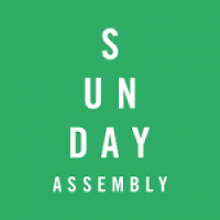Posted on April 1, 2016 by Daniel Braga-Lawlor
By Daniel Braga-Lawlor
Sunday Assembly is a negotiated community, a network of secular congregations across the world, primarily in Western Europe, North America, South Africa, and Australia. The dominant, though occasionally debated, ethos in Sunday Assembly is faith-neutral secularism ("Let's celebrate the one life we have! We don't do deity, but we won't tell you you're wrong if you do!").
Sunday Assemblies organize a monthly celebration, have no official text, no clergy (we rotate hosts for our Sunday celebrations), and each community has great latitude in selecting its speakers, songs and readings, as well as defining the local service work. The songs we sing are not hymns, but come from across pop music - in Northern California, we've sung "Superstition," by Stevie Wonder, "Lean On Me," by Bill Whithers, "Both Sides Now" by Joni Mitchell, "Time after Time," by Cyndi Lauper, and many others. We operate from the premise that knowledge from across the fields (arts, sciences, economics, ethics) offers insights, and that all people, as believers and non- believers alike, matter.
Initially, Sunday Assemblies received press and were billed as "godless congregations." At the first international gathering of Assemblies, held in May 2015 in Atlanta, Georgia, the accredited assemblies voted to change the language from "godless" to "secular" to more fully embrace the living, breathing diversity of who attends: atheist, agnostic, freethinker, spiritual not religious, and those who identify with a religious tradition but find Sunday Assembly of value.
Regardless of our labels, volunteer service is a touchstone of Sunday Assembly work. Just as Unitarian Universalist communities gather both for worship and outward engagement, Sunday Assemblies create monthly community celebrations and seek to offer ways to become involved, as a group, in their wider neighborhood and world.
At our chapter, Sunday Assembly East Bay (the Oakland-Berkeley area in Northern California), our most consistent community work is monthly singing with seniors at a nursing home in Berkeley. For us, the call to recognize this is the one life we know have, encourages active engagement with the people in it.
This service group started about nine months ago thanks to the imagination of Debra Wong, a teacher in our group, and has turned into a regular practice. At last month's senior sing, 9 people joined us, up from our early days of 3 to 5 people.
In the nursing facility, we interact with about two dozen people in the twilight of their lives. Yet there still so much life in that room. I have seen people, contorted and with heads hung, begin tapping their fingers and smiling when they hear a song from their youth. I have seen wonder.
One woman at the facility, Marie, who always has a beautiful knit quilt (orange and black hues) has a special care in her eyes. The first time I met Marie, I asked her what she thought of us, she nodded her head and said, "You're not that good, but I'm glad you came!"
A few months later, she said, "You're pretty good!"
Now, after much more practice, she said "It's beautiful!"
Marie particularly loves when we sing "Proud Mary," either inspired by Clearance Clearwater Revival (Go El Cerrito!) or Tina Turner.
Primarily, we sing- in a group- karaoke style- oldies- music primarily from the 40s, 50s and 60s - with the occasional songs from the 1930s or 1990s for good mix.
"When Irish Eyes are Smiling," is a hit, Elvis' "Can't help Falling in Love," and a sweet, Broadway-style number "You come from Rhode Island!" which tells a joke or two about most US states (but not Ohio, as one attendee, Francis reminds us).
One woman at the home, Kay, with beautiful purple glasses, told me, "What you do, when you sing, you take us to places we can't go anymore. We remember. Thank you."
This type of direct engagement is one that I have found so life-affirming. Regardless of congregational or Assembly labels, the need for human connection, especially with and across elders in our community, is vital to foster a culture that is grounded in compassion.
We can negotiate on terms, but the focus on the one life we have, and what to do with it, remains a consistent opportunity for all secular congregations.






About Daniel Braga-Lawlor
Daniel Braga-Lawlor is a proud Rhode Island ex-pat, and is in love with Northern California. Past President of Bell Street Chapel, a small and mighty Unitarian Universalist congregation in the West End of Providence, RI, Daniel is active with Sunday Assembly East Bay (Berkeley-Oakland area). Collaborative, engaged communities energize and inspire Daniel.